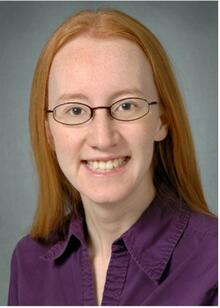 "Good teaching should be inclusive," says Faculty of Mathematics teaching fellow and continuing lecturer Diana Skrzydlo.
"Good teaching should be inclusive," says Faculty of Mathematics teaching fellow and continuing lecturer Diana Skrzydlo.
Recipient of a 2023 University of Waterloo Distinguished Teaching Award, Skrzydlo uses universal design for learning (UDL) to make her courses more inclusive.
Skrzydlo first heard about UDL at the 2019 University of Waterloo Teaching and Learning Conference, which explored teaching and designing for diverse learners.
That conference was transformative for Skrzydlo and challenged her to reflect on the question, "What do we, as instructors, ask our students to do?"
"There isn't just one way to demonstrate knowledge," Skrzydlo explains.
For example, Skrzydlo provides a variety of options for earning participation grades so that students who aren't comfortable speaking up in class can still demonstrate their engagement with the course.
Similarly, she offers student groups the option of delivering an in-person presentation or submitting a pre-recorded presentation.
Skrzydlo also recognizes that students miss class for a variety of reasons and that the classroom learning environment poses barriers for some students. By providing out-of-class alternatives to in-class learning activities, those who miss class aren't penalized.
When asked why she implements UDL, Skrzydlo refers to the "curb-cut effect," which uses the example of curb cuts in the built environment to explain that designing for disabled people also benefits non-disabled people.
For those who are new to UDL, Skrzydlo recommends starting with the principle of flexibility.
"Things like having flexible grading or flexible deadlines are super easy to implement," she says. "If you have 12 assignments or tutorials or activities or anything, just count the top ten out of 12."
She explains that this kind of flexibility not only benefits students living with disabilities such as chronic pain, or a traumatic brain injury, it also benefits students who are juggling multiple deadlines in their courses and those experiencing challenges in their personal life.
Skrzydlo often encounters skeptics who argue that UDL coddles students and doesn't prepare them for the "real world."
She adamantly disagrees, saying, "it's just not true that the real world is inflexible. In fact, the real world is often more flexible and more forgiving than the academy".
She also emphatically refutes the suggestion that UDL compromises academic rigor. "It's not about reducing the requirements. It's about giving people support to reach the bar that you've set and maybe reach it in a different way," she says.
Skrzydlo emphasizes that a very small change can make a huge difference to students.
"You can make a tiny, tiny change that's almost zero work, and make your teaching accessible to a larger number of people. Why not do that?"
Accessibility Tip: Provide clear instructions for assignments and communicate your expectations, and when possible, provide some choice in how students demonstrate their learning.






